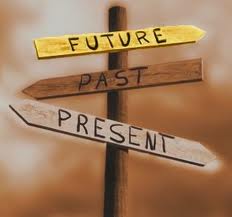 Our sages point to a similarity between two words in the Hebrew language that project very different messages and meaning. The word VaYehi Biyimei means ” And it was in the days of..”The other word, VeHaya means ” And it will be. ” It is the construction of these words that is most interesting.
Our sages point to a similarity between two words in the Hebrew language that project very different messages and meaning. The word VaYehi Biyimei means ” And it was in the days of..”The other word, VeHaya means ” And it will be. ” It is the construction of these words that is most interesting.
The word VaYehi is made up of the connecting letter Vav ( and ) and the word Yehi which is actually in the future tense. This Vav called the Vav hahippuch ,according to Hebrew grammatical rules, changes the tense of a word. In this case it does so from future to past. The same is true of the word VeHaya which is made up of the same connecting Vav and the word Haya which is in the past tense .The Vav transforms the meaning of the word Haya (was) to the future tense , “and it will be”
More importantly ,our sages teach that when we read the words ” Vayehi BiYimei-” (And it was in the days of) in a verse, we are to expect sorrow sadness and calamity (tractate Megilla 10b ). We see this in the book of Esther , ” Now it came to pass ( VaYehi) in the days of Ahashverush..” (Esther1;1) . We see it again in the book of Ruth;” And it came to pass ( VaYehi )in the days when the judges judged, that there was a famine in the land.( Ruth 1:1). The word Vayehi appears again in Isaiah ; ” And it came to pass ( VaYehi ) in the days of Ahaz the son of Jotham, the son of Uzziah, king of Judah, that Rezin the king of Aram, and Pekah the son of Remaliah, king of Israel, went up to Jerusalem to war against it; but could not prevail against it. “( Isaiah 7:1)
On the other hand ,the word VeHaya according to our sages, always denotes joy and anticipated happiness (Bereshith Rabba 42:3). We see an example of this in this week’s torah portion of Eikev; And it shall come to pass,(VeHaya) because ye hearken to these ordinances, and keep, and do them, that HaShem thy God shall keep with thee the covenant and the mercy which He swore unto thy fathers, ( deuteronomy 7:12). Then again; “And it shall be,(VeHaya) when HaShem thy God shall bring thee into the land which He swore unto thy fathers, to Abraham, to Isaac, and to Jacob, to give thee–great and goodly cities, which thou didst not build, ( deuteronomy 6:10).And again; ” And it shall come to pass,(VeHaya) if ye shall hearken diligently unto My commandments which I command you this day, to love HaShem your God, and to serve Him with all your heart and with all your soul, that I will give the rain of your land in its season, the former rain and the latter rain, that thou mayest gather in thy corn, and thy wine, and thine oil. (Deuteronomy 11:13-14)
Our past and our future are intricately connected. Yet the way that connection is made, greatly affects our present sense of being. There are those who are imprisoned by the difficult journey of the past and have taken their vision of destiny and have diminished it. They have taken the future and have cast it into the past. That is the sadness of “VaYehi”.
There are others who have looked back on their difficult journey and have overcome its despair and pain and have harnessed it into the future. They have taken their past and have retransformed it in light of their future sense of destiny. That is the joy expressed by the word “VeHaya.”
Our people have been travelling a long and circuitous path towards destiny. We have experience great moments of grandeur and joy. Yet we have also experienced the valley of the shadow of death. There are many of our people that have succumbed and lost faith in their destiny. There are even many that have joined our enemies in an attempt to cope with the pain of the moment.
Yet a growing remnant has never lost the joy of true vision and destiny. Today you will find them, even after being expelled six years ago from Gush Katif,in the newly blossoming sands of the Halutza desert. You will discover then in the growing ranks of young people volunteering hours and days with the less fortunate in our society. You will find them building, planting and growing in the maligned settlements in the biblical heartland.
Those that define their future by past difficulties are doomed to flounder. Yet they too will be redirected by the others amidst our people that have not lost the power of using future and promise to redefine the pain of the past.
VeHaya.. it shall come to pass that HaShem shall be King over all the earth; in that day HaShem will be One, and His name One. ( Zecharia 14:9)

Shalom Moshe,
Thank you for teaching us about the intricacies of the Hebrew language. It is complicated, but I get the gist of connecting the past to the future. I recently saw a speaker on TV giving her life testimony. Briefly, when she was a child, her father, the preacher in a small southern USA town, began to teach the town to stand up for themselves against the man who basically owned every thing in the town. If he didn’t he would persecute and terrorize them into giving up their money and property. The situation lasted five years, and led to her mother being murdered. Eventually, after moving away, her father died of a heart attack while she was a teenager. Years later, the man went to jail. There in jail he met Jesus. He didn’t die. God broke his heart with His mercy. The woman said something that really stuck with me about dealing with her past. “When God took my father away, I wanted to be angry at Him, because I needed my daddy. I realized that I needed God more than I needed to be angry at God.” Sorry I do not remember the people in the interiew. I just had the TV on while busy in the house.
Anyway, in dealing with my own far less important situations, I have also learned that I need God’s presence, and His spirit to continue to be real in my life every single day, more than I want any of the things in this world. This is the daily battle that keeps me moving to the future. I am not sure, but this may be what you refer to as “the journey”.
Blessings and Peace,
Amy